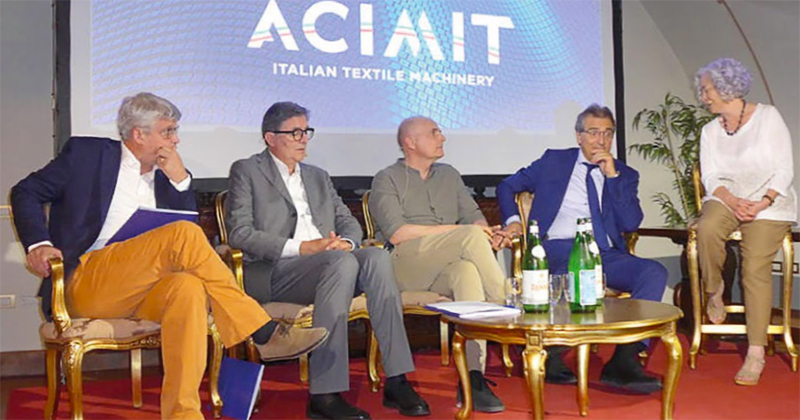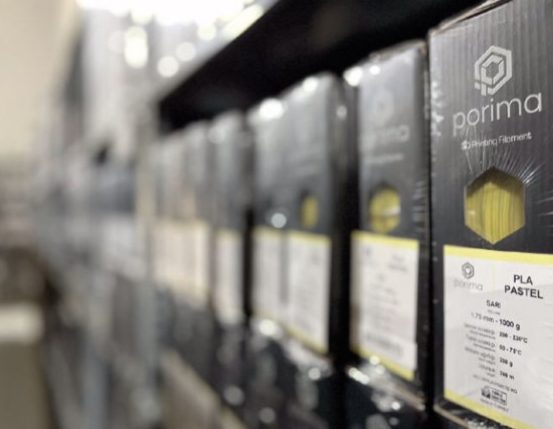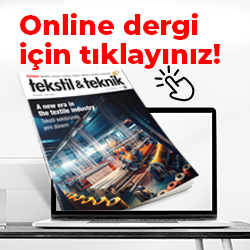The objective critical issues faced by Italy as a whole throughout the course of 2021, primarily dictated by a pandemic that upset any and all pre-existing equilibriums, have not slowed or halted the Italian textile machinery sector.
Indeed, data presented during the annual assembly of ACIMIT, the Association of Italian Textile Machinery Manufacturers, held on 1 July proved decidedly positive, showing that in 2021 the sector recovered significantly compared to 2020, to the point of returning to pre-Covid levels.
Specifically, Italian textile machinery production amounted to 2.388 billion euros (+35% over 2020 and + 5% over 2019), with total exports amounting to 2.031 billion euros (+37% over 2020 and +9% over 2019).
However, these results do not cancel the obstacles that companies are still facing. Looking to the near future, expectations are for a rather uncertain outlook, as underscored by ACIMIT President Alessandro Zucchi: “2022 remains a year replete with unknown factors, starting with the Russian-Ukrainian conflict, along with the persistence of the pandemic, which seriously risk delaying expected growth consolidation for businesses in the sector. Difficulties in finding raw materials and components negatively affect the completion and fulfilment of orders processed as far back as 2021. To boot, rising energy costs and inflationary trends affecting numerous commodities are depressing overall business confidence. So, the outlook for the sector is not so good.”
As such, the two cornerstones through which ACIMIT aims to support the Italian textile machinery sector are digitalization and sustainability.
4.0: The textile machinery sector looks to the future
The road to digital transformation has already led numerous manufacturers to completely rethink their production processes, rendering them more efficient and less expensive. The digital world is moving ahead at a decisive rate in the textile machinery sector, where the buzzwords are increasingly, for instance, the Internet of Things connecting to a company’s ecosystem, machine learning algorithms applied to production, predictive maintenance, and the integrated cloud management of various production departments. It is no coincidence that ACIMIT has focused decisively on its Digital Ready project, through which Italian textile machinery that adopt a common set of data are certified, with the aim of facilitating integration with the operating systems of client companies (ERP, MES, CRM, etc.).
A green soul
Combining production efficiency and respect for the environment: a challenge ACIMIT has made its own and which it promotes among its members through the Sustainable Technologies project. Launched by the association as early as 2011, the project highlights the commitment of Italian textile machinery manufacturers in the area of sustainability. At the heart of the project is the Green Label, a form of certification specifically for Italian textile machinery which highlights its energy and environmental performance. An all-Italian seal of approval developed in collaboration with RINA, an international certification body.
The project’s many benefits: the Rina Consulting survey
The assembly held on 1 July provided an opportunity to take stock of the Sustainable Technologies project, more specifically, with the presentation of the Rina Consulting survey on the Green Label’s evolution and impact in recent years.
The results have confirmed the initiative’s extreme validity. The technological advances implemented by the association’s machinery producers participating in the project have effectively translated into benefits in terms of environmental impact (reduction of CO2 equivalent emissions for machinery), as well as economic advantages for machinery users.
With reference to the year 2021, a total of 204,598 tons of CO2 emissions avoided on an annual basis have been quantified, thanks to the implementation of improvements on machinery. This is a truly significant reduction which, for the sake of comparison, corresponds to the carbon dioxide emissions generated by 36,864 automobiles travelling an average of 35,000 km a year. In terms of energy savings, the use of green labeled textile machinery has provided excellent performances in allowing for a reduction of up to 84% in consumption.
A round table discussion on the Green Label’s primary purpose
The environmental and economic impact generated in production processes for Italian textile machinery through the use of Green Label technologies was the focus of the round table which concluded the ACIMIT assembly.
Moderated by Aurora Magni (professor of the Industrial Systems Sustainability course at the LIUC School of Engineering), the debate involved Gianluca Brenna (Lipomo Printing House administrator and Vice President of the Italian Fashion System for Welfare), Pietro Pin
(Benetton Group consultant and President of UNI for the textile-clothing area), Giorgio Ravasio (Italy Country Manager for Vivienne Westwood), as well as ACIMIT President Alessandro Zucchi.
Called on to compare common factors in their experiences relating to environmental transition processes for their respective companies, the participants were unanimous: the future of Italian textile machinery can no longer ignore advanced technology developments capable of offering sustainable solutions with a low environmental impact while also reducing production costs. This philosophy has by now been consolidated, and has proven to lead directly to a circular economy outlook.
The upcoming ITMA 2023 exhibit
Lastly, a word on ITMA 2023, the most important international exhibition for textile machinery, to be held in Italy from 8 to 14 June 2023 at Fiera-Milano Rho. Marking the 19th edition of ITMA, this trade fair is an essential event for the entire industry worldwide, providing a global showcase for numerous innovative operational solutions on display. A marketplace that offers participants extraordinary business opportunities. The participation of Italian companies is managed by ACIMIT.

















